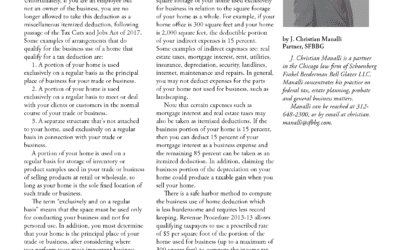In April of 2022, the City of Chicago’s City Council passed an amendment to the Municipal Code ordinance addressing sexual harassment in the workplace (the “Amendment”). What follows is a brief summary of the key aspects of the Amendment impacting employers and employees in Chicago:
The existing ordinance prohibits sexual harassment and discrimination on the basis of sexual orientation and other protected characteristics. The Amendment expands the definition of “sexual orientation” to mean “a person’s actual or perceived sexual and emotional attraction, or lack thereof, to another person.” Prior to the Amendment, the ordinance defined “sexual attraction” to mean “the actual or perceived state of heterosexuality, homosexuality or bisexuality.”
As of July 1, 2022, every employer with a business facility in the City of Chicago is required to have a written policy prohibiting sexual harassment which must include a statement that sexual harassment, and retaliation for reporting sexual harassment, is illegal in Chicago. The policy must also set forth the ordinance’s definition of sexual harassment, which means any:
- unwelcome sexual advances or unwelcome conduct of a sexual nature;
- requests for sexual favors or conduct of a sexual nature when:
- submission to such conduct is made either explicitly or implicitly a term or condition of an individual’s employment; or
- submission to or rejection of such conduct by an individual is used as the basis for any employment decision affecting the individual; or
- such conduct has the purpose or effect of substantially interfering with an individual’s work performance or creating an intimidating, hostile, or offensive working environment; or
- sexual misconduct, which means any behavior of a sexual nature which also involves coercion, abuse of authority, or misuse of an individual’s employment position.
The Amendment also requires covered employers to provide sexual harassment prevention training to all employees on an annual basis. While Illinois law already requires all Illinois employers to provide annual sexual harassment training, the Amendment imposes specific, heightened training requirements for Chicago employers.[1] Specifically, the Amendment requires that all employees must participate in a minimum of one hour of sexual harassment training each year, and any employee who supervises or manages employees must participate in a minimum of two hours of sexual harassment prevention training each year. The employer’s written sexual harassment policy is required to set forth the sexual harassment training requirements.
The employer’s written policy should include examples of prohibited conduct that constitute sexual harassment as well as specific information on how an individual can report an allegation of sexual harassment. Specifically, the written policy must set forth instructions on how to make a confidential internal report to a manager, the employer’s corporate headquarters or HR department. In addition, the written policy must identify legal services, including governmental, available to employees who may be victims of sexual harassment. Chicago employers are required to provide the written sexual harassment policy in an employee’s primary language within the first calendar week of the employee’s employment.
In addition to the written sexual harassment policy, Chicago employers are required to display posters in the workplace designed by the City of Chicago’s Commission on Human Relations regarding prohibitions on sexual harassment. The Amendment requires employers to display at least one poster in English and one poster in Spanish.
To comply with the Amendment, Chicago employers must maintain records of the employer’s written policy prohibiting sexual harassment, trainings given to each employee, and other records necessary to demonstrate compliance with the ordinance for at least five years, or the duration of any claim, civil action or investigation pending pursuant to the ordinance, whichever is longer. Failing to maintain such records is deemed to create a presumption, rebuttable by clear and convincing evidence, that the employer violated the ordinance.
Failure to comply with the Amendment’s requirements regarding the written sexual harassment policy, annual sexual harassment training for all employees and managers, and sexual harassment posters, will result in a fine of $500 to $1,000 for each offense. Every day that a violation continues is deemed a separate and distinct violation.
For any questions regarding the City of Chicago’s workplace sexual harassment prohibitions or other employment law matters, please contact an attorney at SFBBG by phone at (312) 648-2300.
[1] We previously discussed Illinois’ mandatory sexual harassment prevention training requirements applicable to all Illinois employers in a series of articles available on the firm’s website:
Illinois Department of Human Rights Publishes Model Sexual Harassment Prevention Training Program, available at https://www.sfbbg.com/covid-19/illinois-department-of-human-rights-publishes-model-sexual-harassment-prevention-training-program/
2020 Ushered in Significant and Far-Reaching Changes to Illinois’ Employment Laws: Is Your Business in Compliance? available at https://www.sfbbg.com/insights/2020-ushered-in-significant-and-far-reaching-changes-to-illinois-employment-laws-is-your-business-in-compliance/
Illinois Department of Human Rights Issues New Guidance Regarding Employer Mandatory Sexual Harassment Training Requirements available at https://www.sfbbg.com/insights/illinois-department-of-human-rights-issues-new-guidance-regarding-employer-mandatory-sexual-harassment-training-requirements/



